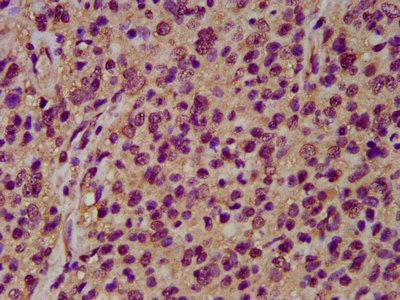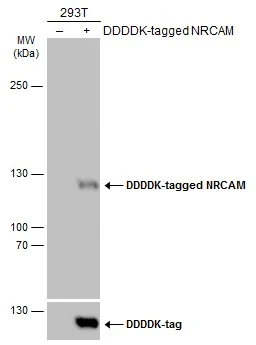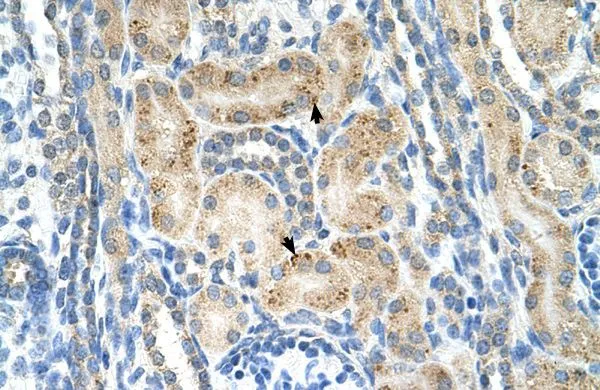![WB analysis of HEK293 (1) and NRCAM (AA: 1192-1255)-hIgGFc transfected HEK293 (2) cell lysate using GTX60770 NRCAM antibody [7D8C5]. WB analysis of HEK293 (1) and NRCAM (AA: 1192-1255)-hIgGFc transfected HEK293 (2) cell lysate using GTX60770 NRCAM antibody [7D8C5].](https://www.genetex.com/upload/website/prouct_img/normal/GTX60770/GTX60770_20170912_WB_w_23061123_690.webp)
WB analysis of HEK293 (1) and NRCAM (AA: 1192-1255)-hIgGFc transfected HEK293 (2) cell lysate using GTX60770 NRCAM antibody [7D8C5].
NRCAM antibody [7D8C5]
GTX60770
ApplicationsImmunoFluorescence, Western Blot, ELISA, ImmunoCytoChemistry
Product group Antibodies
ReactivityHuman
TargetNRCAM
Overview
- SupplierGeneTex
- Product NameNRCAM antibody [7D8C5]
- Delivery Days Customer9
- Application Supplier NoteWB: 1/500 - 1/2000. ICC/IF: 1/50. ELISA: 1/10000. *Optimal dilutions/concentrations should be determined by the researcher.Not tested in other applications.
- ApplicationsImmunoFluorescence, Western Blot, ELISA, ImmunoCytoChemistry
- CertificationResearch Use Only
- ClonalityMonoclonal
- Clone ID7D8C5
- Concentration1 mg/ml
- ConjugateUnconjugated
- Gene ID4897
- Target nameNRCAM
- Target descriptionneuronal cell adhesion molecule
- Target synonymsNEDNMS, neuronal cell adhesion molecule, NgCAM-related cell adhesion molecule, neuronal surface protein Bravo
- HostMouse
- IsotypeIgG1
- Protein IDQ92823
- Protein NameNeuronal cell adhesion molecule
- Scientific DescriptionCell adhesion molecules (CAMs) are members of the immunoglobulin superfamily. This gene encodes a neuronal cell adhesion molecule with multiple immunoglobulin-like C2-type domains and fibronectin type-III domains. This ankyrin-binding protein is involved in neuron-neuron adhesion and promotes directional signaling during axonal cone growth. This gene is also expressed in non-neural tissues and may play a general role in cell-cell communication via signaling from its intracellular domain to the actin cytoskeleton during directional cell migration. Allelic variants of this gene have been associated with autism and addiction vulnerability. Alternative splicing results in multiple transcript variants encoding different isoforms. [provided by RefSeq, Jul 2008]
- ReactivityHuman
- Storage Instruction-20°C or -80°C,2°C to 8°C
- UNSPSC12352203

![ELISA analysis of antigen using GTX60770 NRCAM antibody [7D8C5].
Black : Control antigen 100ng
Purple : Antigen 10ng
Blue : Antigen 50ng
Red : Antigen 100ng ELISA analysis of antigen using GTX60770 NRCAM antibody [7D8C5].
Black : Control antigen 100ng
Purple : Antigen 10ng
Blue : Antigen 50ng
Red : Antigen 100ng](https://www.genetex.com/upload/website/prouct_img/normal/GTX60770/GTX60770_20170912_ELISA_w_23061123_221.webp)
![ICC/IF analysis of HepG2 cells using GTX60770 NRCAM antibody [7D8C5]. Green : NRCAM Blue: DRAQ5 fluorescent DNA dye Red: Actin filaments ICC/IF analysis of HepG2 cells using GTX60770 NRCAM antibody [7D8C5]. Green : NRCAM Blue: DRAQ5 fluorescent DNA dye Red: Actin filaments](https://www.genetex.com/upload/website/prouct_img/normal/GTX60770/GTX60770_20170912_ICCIF_w_23061123_712.webp)






